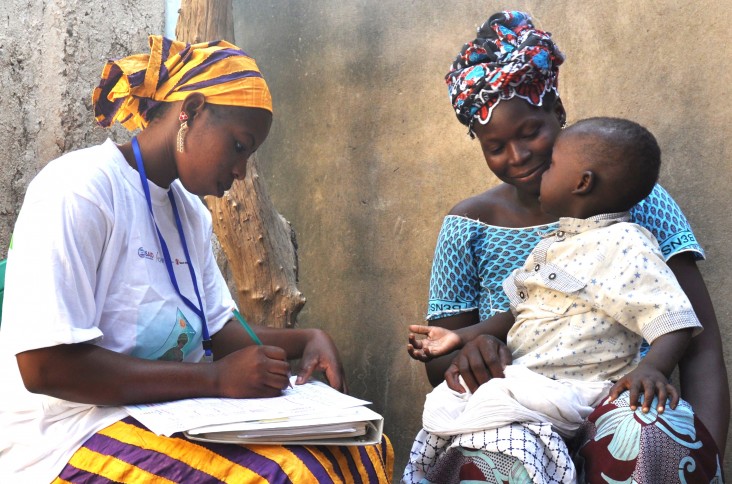
April 2014—When Saran’s* 2-year-old son became sick, she immediately took him to visit her community health worker, Djenebou Keita, who has been working in the village for the last two years. She took the child’s temperature, confirmed that he had a fever, and then performed a rapid diagnostic test for malaria. Within minutes, Saran’s son was diagnosed. Keita administered the first dose of antimalarial drugs and gave the rest of the treatment to his mother. The health worker also told them when they should come back for a follow-up and how they could prevent malaria in the future.
“I came to the community health worker because my son had a fever, and I’m thankful we were able to get medicine,” Saran said. She had already experienced the death of one child and was grateful that her other child could receive care right there in her village.
Approximately one in 10 children in Mali die before reaching their 5th birthday, and malaria is the number one cause of death. Geographic and economic access to care is a major challenge for malaria diagnosis and treatment in Mali, where only 60 percent of the population have access to a health center within five kilometers of their homes.
USAID, through the President’s Malaria Initiative (PMI), promotes use of insecticide-treated bed nets, indoor residual spraying, intermittent preventive treatment for pregnant women, and diagnosis with rapid diagnostic tests and treatment. Since 2008, USAID has distributed approximately 6 million bed nets to Malian families located throughout the country.
Although mosquito net ownership per household is at 84 percent, malaria prevalence remains high with 52 percent of children carrying malaria parasites during the rainy season.
Before rapid diagnostic test kits were available to community health workers, mothers like Saran would have to take their kids to the nearest health facility, often a three- to four-hour walk, to be diagnosed and receive treatment. PMI helped to introduce the Integrated Community Case Management strategy, training and equipping community health workers to treat common childhood diseases, including uncomplicated cases of malaria after confirmation by a rapid diagnostic test. Since 2008, PMI has purchased and distributed more than 4.4 million courses of malaria treatment and 3.6 million rapid diagnostic test kits for health facilities and community health workers.
The investments have paid off. The number of malaria cases diagnosed in Mali increased from less than 10 percent when PMI started in 2008 to around 70 percent in 2013. Now, with rapid tests and treatment, mothers like Saran can prevent their children from becoming victims of one of the world’s deadliest diseases.
*Full name not available.







Comment
Make a general inquiry or suggest an improvement.